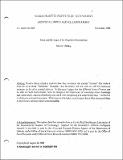Jokes and the Logic of the Cognitive Unconscious
| dc.contributor.author | Minsky, Marvin | en_US |
| dc.date.accessioned | 2004-10-01T20:31:47Z | |
| dc.date.available | 2004-10-01T20:31:47Z | |
| dc.date.issued | 1980-11-01 | en_US |
| dc.identifier.other | AIM-603 | en_US |
| dc.identifier.uri | http://hdl.handle.net/1721.1/5701 | |
| dc.description.abstract | Freud's theory of jokes explains how they overcome the mental "censors" that make it hard for us to think "forbidden" thoughts. But his theory did not work so well for humorous nonsense as for other comical subjects. In this essay I argue that the different forms of humor can be seen as much more similar, once we recognize the importance of knowledge about knowledge and, particularly, aspects of thinking concerned with recognizing and suppressing bugs ??neffective or destructive thought processes. When seen in this light, much humor that at first seems pointless, or mysterious, becomes more understandable. | en_US |
| dc.format.extent | 25 p. | en_US |
| dc.format.extent | 11924678 bytes | |
| dc.format.extent | 8672677 bytes | |
| dc.format.mimetype | application/postscript | |
| dc.format.mimetype | application/pdf | |
| dc.language.iso | en_US | |
| dc.relation.ispartofseries | AIM-603 | en_US |
| dc.subject | memory | en_US |
| dc.subject | knowledge | en_US |
| dc.subject | bugs | en_US |
| dc.subject | frame | en_US |
| dc.subject | logic | en_US |
| dc.title | Jokes and the Logic of the Cognitive Unconscious | en_US |
